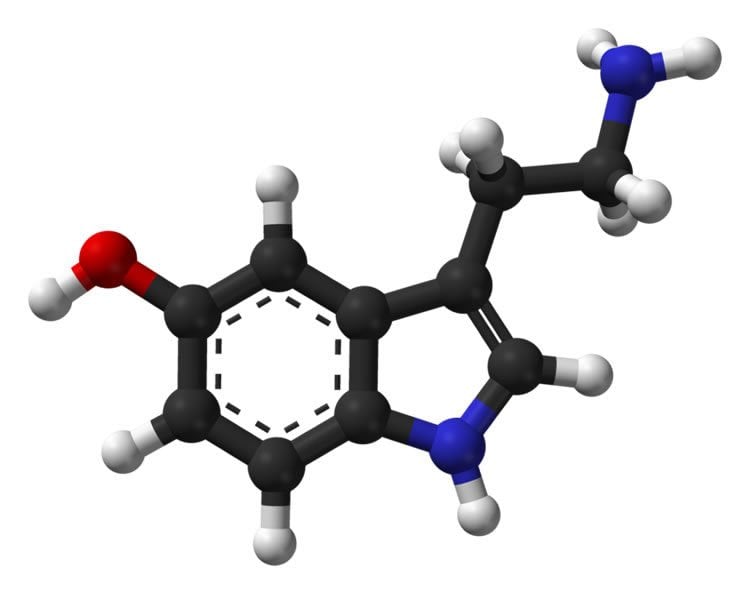Summary: A new paper may help answer some questions as to why some infants die suddenly. Looking at blood samples from infants who had died of SIDS, researchers discover 31% of the children had elevated levels of serotonin. The researchers concluded that abnormal serotonin metabolism could indicate an underlying vulnerability that increases SIDS risk.
Source: NIH/NICHD.
Findings from NIH-funded study could provide basis for forensic SIDS test.
Blood samples from infants who died of Sudden Infant Death Syndrome (SIDS) had high levels of serotonin, a chemical that carries signals along and between nerves, according to a study funded in part by the National Institutes of Health. The finding raises the possibility that a test could be developed to distinguish SIDS cases from other causes of sleep-related, unexpected infant death. The study, led by Robin L. Haynes, Ph.D., of Boston Children’s Hospital and Harvard Medical School, appears in the Proceedings of the National Academy of Sciences. NIH’s Eunice Kennedy Shriver National Institute of Child Health and Human Development (NICHD) provided funding for the work.
SIDS is the sudden death of an infant under one year of age that remains unexplained after a complete autopsy and death scene investigation. In the current study, researchers reported that 31 percent of SIDS infants (19 of 61) had elevated blood levels of serotonin. In previous studies, the researchers reported multiple serotonin-related brain abnormalities in SIDS cases, including a decrease in serotonin in regions involved in breathing, heart rate patterns, blood pressure, temperature regulation, and arousal during sleep.
Taken together, the researchers wrote, the findings suggest that an abnormality in serotonin metabolism could indicate an underlying vulnerability that increases SIDS risk and that testing blood samples for serotonin could distinguish certain SIDS cases from other infant deaths. However, they caution that more research is needed.

NICHD’s Safe to Sleep campaign provides information on ways to reduce the risk of SIDS and other sleep-related causes of infant death.
Rosemary Higgins, M.D., of the NICHD Pregnancy and Perinatology Branch, which oversaw the study, is available for comment.
Funding: Funding provided by NIH/Eunice Kennedy Shriver National Institute of Child Health and Human Development.
Source: Meredith Daly – NIH/NICHD
Image Source: NeuroscienceNews.com image is in the public domain.
Original Research: Full open access research for “High Serum Serotonin in Sudden Infant Death Syndrome” by Robin L. Haynes, Andrew L. Frelinger III, Emma K. Giles, Richard D. Goldstein, Hoa Tran, Harry P. Kozakewich, Elisabeth A. Haas, Anja J. Gerrits, Othon J. Mena, Felicia L. Trachtenberg, David S. Paterson, Gerard T. Berry, Khosrow Adeli, Hannah C. Kinney, and Alan D. Michelson in PNAS. Published online July 3 2017 doi:10.1073/pnas.1617374114
[cbtabs][cbtab title=”MLA”]NIH/NICHD “High Serotonin Levels in Blood of SIDS Infants.” NeuroscienceNews. NeuroscienceNews, 3 July 2017.
<https://neurosciencenews.com/serotonin-sids-7023/>.[/cbtab][cbtab title=”APA”]NIH/NICHD (2017, July 3). High Serotonin Levels in Blood of SIDS Infants. NeuroscienceNew. Retrieved July 3, 2017 from https://neurosciencenews.com/serotonin-sids-7023/[/cbtab][cbtab title=”Chicago”]NIH/NICHD “High Serotonin Levels in Blood of SIDS Infants.” https://neurosciencenews.com/serotonin-sids-7023/ (accessed July 3, 2017).[/cbtab][/cbtabs]
Abstract
High Serum Serotonin in Sudden Infant Death Syndrome
Sudden infant death syndrome (SIDS), the leading cause of postneonatal infant mortality, likely comprises heterogeneous disorders with the common phenotype of sudden death without explanation upon postmortem investigation. Previously, we reported that ∼40% of SIDS deaths are associated with abnormalities in serotonin (5-hydroxytryptamine, 5-HT) in regions of the brainstem critical in homeostatic regulation. Here we tested the hypothesis that SIDS is associated with an alteration in serum 5-HT levels. Serum 5-HT, adjusted for postconceptional age, was significantly elevated (95%) in SIDS infants (n = 61) compared with autopsied controls (n = 15) [SIDS, 177.2 ± 15.1 (mean ± SE) ng/mL versus controls, 91.1 ± 30.6 ng/mL] (P = 0.014), as determined by ELISA. This increase was validated using high-performance liquid chromatography. Thirty-one percent (19/61) of SIDS cases had 5-HT levels greater than 2 SDs above the mean of the controls, thus defining a subset of SIDS cases with elevated 5-HT. There was no association between genotypes of the serotonin transporter promoter region polymorphism and serum 5-HT level. This study demonstrates that SIDS is associated with peripheral abnormalities in the 5-HT pathway. High serum 5-HT may serve as a potential forensic biomarker in autopsied infants with SIDS with serotonergic defects.
“High Serum Serotonin in Sudden Infant Death Syndrome” by Robin L. Haynes, Andrew L. Frelinger III, Emma K. Giles, Richard D. Goldstein, Hoa Tran, Harry P. Kozakewich, Elisabeth A. Haas, Anja J. Gerrits, Othon J. Mena, Felicia L. Trachtenberg, David S. Paterson, Gerard T. Berry, Khosrow Adeli, Hannah C. Kinney, and Alan D. Michelson in PNAS. Published online July 3 2017 doi:10.1073/pnas.1617374114






